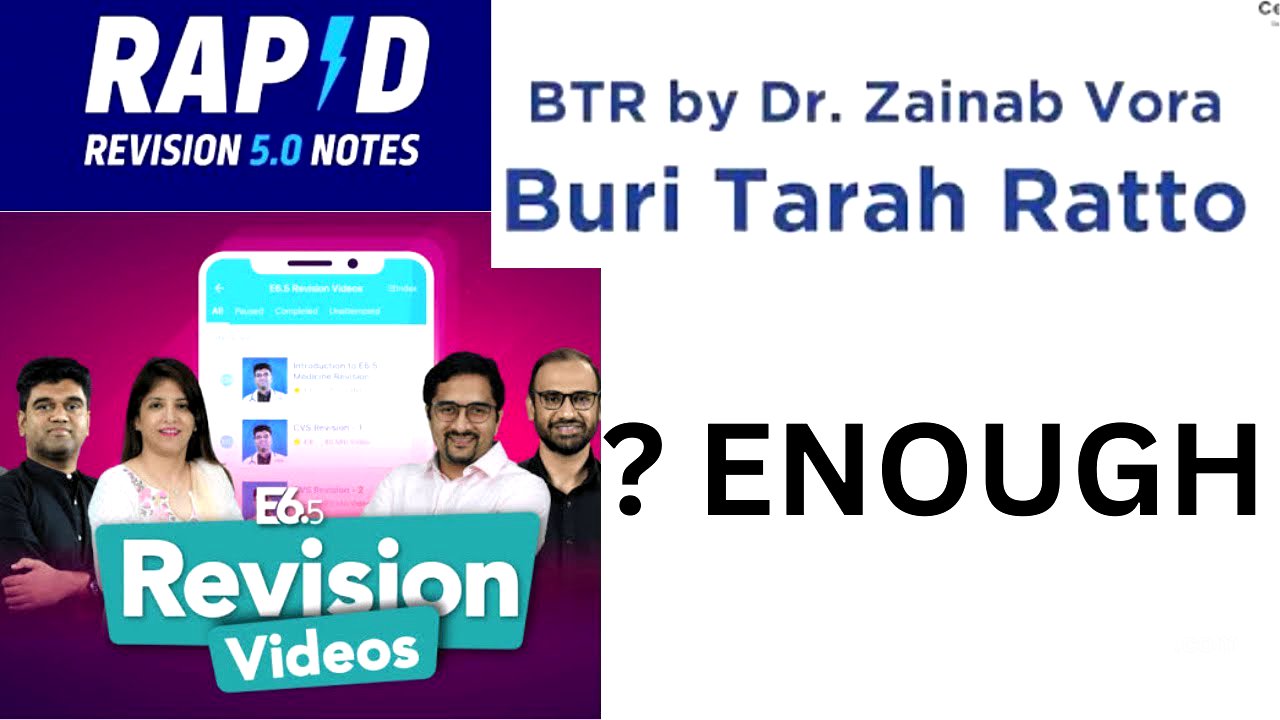TLDR;
Dr. Aditya Sanjay Gupta discusses how much to study for PG entrance exams, emphasising that "enough" varies for each person. Key points include being realistic about your capacity, considering the time you have left, and avoiding FOMO. He also talks about setting achievable goals based on your MBBS performance and available time, and trusting the guidance provided by mentors instead of blaming them for failures.
- Being realistic about your capacity and time is crucial.
- Tailor your study plan based on your MBBS performance and available time.
- Trust your mentors and avoid blaming them for your failures.
Introduction: The Question of "Enough" [0:00]
Dr. Gupta addresses a common question: Is doing BTR (Better Than Revision) or rapid revision enough for PG entrance exams? He clarifies that the concept of "enough" is subjective and depends on individual capabilities and circumstances. He uses the analogy of not biting off more than you can chew, suggesting that it's better to focus on what you can effectively revise and remember rather than trying to cover everything superficially.
Key Factors Determining "Enough" [1:00]
The doctor outlines three critical factors in determining what's "enough" for you: your brain size (capacity to learn), how much you can remember, and how much time you have left. He cautions against unrealistic expectations, especially if you haven't been diligent during MBBS. He warns against thinking that attending a short revision session can compensate for years of neglecting studies.
Setting Realistic Goals [3:50]
Dr. Gupta explains how to set achievable goals. He mentions that aiming for a top rank (100-500) requires consistent preparation starting from the third or fourth year of MBBS. He compares this to the NEET UG exam, where cracking it in three months is generally not possible. However, if you were a decent student and have six to nine months, you can aim for a good rank with dedicated preparation.
Strategies for Different Rank Targets [5:51]
For those aiming for a rank between 3000 and 5000 with only four to five months left, Dr. Gupta advises focusing on rapid revision courses like BTR and supplementing it with the previous five years' question papers. He stresses the importance of thoroughly understanding these resources. He also suggests that First Aid is more suitable for those who have six months to prepare.
Two Methods to Reach a Concise Resource [7:52]
Dr. Gupta describes two methods to create a concise study resource. The first, "trim-down method," involves studying main videos during MBBS or internship and then trimming down the notes. The second, "bulk-up method," is for those with less time, where they directly use rapid revision videos and add extra information from past papers. The trim-down method generally yields better results due to a broader base of knowledge.
Adapting Your Strategy Based on Time [9:34]
If you have already started with rapid revision and have some time left, Dr. Gupta suggests focusing on key subjects like surgery, OBGYN, pathology, pharmacology, and microbiology to improve your rank. He reiterates that aiming for a top rank requires consistent effort throughout MBBS and a longer preparation period.
Addressing Common Concerns and Misconceptions [11:00]
Dr. Gupta addresses the misconception that toppers only rely on BTR. He clarifies that these toppers had a strong foundation and used BTR for revision. He emphasises that if you haven't studied anything and only have three months, focusing on BTR and past papers can help you achieve a decent rank (2000-5000).
The Importance of Trust and Avoiding Blame [11:59]
The doctor urges students to trust their mentors and avoid blaming them for their failures. He points out that mentors provide guidance for your benefit, and ultimately, your success depends on your effort. He advises students to either trust their mentors or study independently instead of blaming others.
Focus on High-Yield Topics and Repeated Revision [13:27]
Dr. Gupta advises focusing on high-yield topics and revising them repeatedly. He uses an example: if 2000 pages give you 70% correct answers, it's better to master those than chase 10,000 pages. He also mentions that some questions are designed to be skipped and that focusing on repeated topics is key to success.
Categorising Study Plans Based on Time and Preparation [16:24]
Dr. Gupta categorises study plans based on the time available and your MBBS performance. If you have six to nine months and were a decent student, go through main notes and use First Aid. If you have less time (four to five months), focus on rapid revision and past papers. If you have less than three months, avoid delusions and focus solely on BTR and past papers.
Final Advice [18:32]
Dr. Gupta concludes by reiterating that "enough" is anything that covers the past five years' topics and can be revised in the last 7-10 days. He advises students to consider their available time, learning capacity, and revision capabilities to determine what's sufficient for them.



![If I Wanted to Become a Millionaire In 2024, This is What I'd Do [FULL BLUEPRINT]](https://wm-img.halpindev.com/p-briefread_c-10_b-10/urlb/aHR0cDovL2ltZy55b3V0dWJlLmNvbS92aS9WQm9STEppbVZ6Yy9ocWRlZmF1bHQuanBn.jpg)





